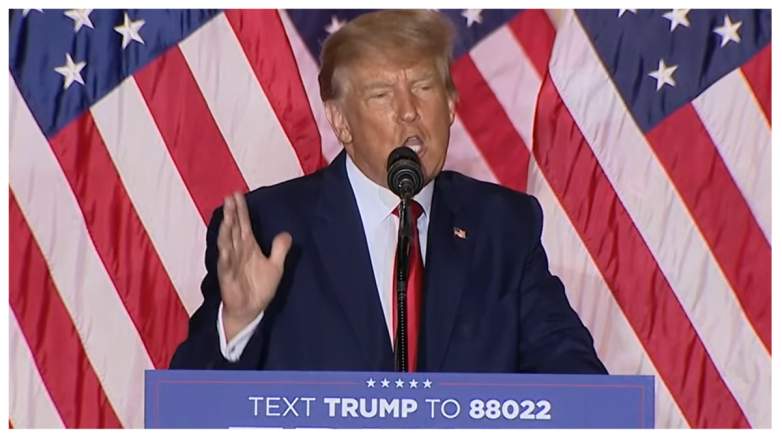
Getty Donald Trump.
With former President Donald Trump now facing two separate indictments, some are wondering whether a convicted felon can run for or be president.
If Trump were to be convicted – he maintains his innocence against the charges – could he still be president?
That requires some complicated legal analysis, but a felony conviction alone does not bar a person from running for, or serving as, the United States president, according to Politifact.
You can read the Trump indictment here.
Former President Donald Trump has confirmed in a post on Truth Social that he has been indicted in the investigation into classified documents. He called the Biden administration “corrupt.” Trump is already facing pending criminal charges in Manhattan after being accused of falsifying business documents relating to payments to Stormy Daniels.
“We’re learning from our sources that there appears to be at least seven counts here. This ranges from everything from the willful retention of national defense information to conspiracy to a scheme to conceal to false statements and representations,” ABC News’ Katherine Faulders reported.
Here’s what you need to know:
The U.S. Constitution Made No Prohibition on a Felon Running for President

GettyDonald Trump was indicted, he confirmed.
“A criminal conviction does not prevent a person from running for president,” Barbara L. McQuade, a University of Michigan law professor and former U.S. Attorney, told Politifact, when the site explored this question. “The Constitution controls this question, and it makes no prohibition. States can decide their own rules for who is eligible to hold office within their own states, but they cannot disqualify someone from running for president.”
Politifact concluded, “The short answer is legally, it appears that Trump could still run for president, even if convicted of a crime.”
According to Politifact, some might argue whether Section 3 of the 14th Amendment could prevent Trump from running and serving if he is convicted.
Justia.com noted that “at least some of the charges Trump faces could be deemed ‘high crimes and misdemeanors’ within the meaning of Article II, Section 4 of the Constitution, thus warranting impeachment by the House and removal by the Senate.” This provision would be unlikely to get enough Republican support, Justia noted.
If Trump was incarcerated on election day and was elected that might leave him “unable to discharge the powers and duties of his office” within the meaning of the Twenty-fifth Amendment,” Justia reported, but the site added that Trump’s cabinet majority and vice president would have to agree.
The Constitution Does Ban People From Serving as President Who ‘Engaged in Insurrection or Rebellion’ But Donald Trump Might Pardon Himself

YouTubeTrump
One Constitutional provision says no person “shall be a Senator or Representative in Congress, or elector of President and Vice-President, or hold any office, civil or military” who previously taken an oath to support the Constitution and then “engaged in insurrection or rebellion against the same, or given aid or comfort to the enemies thereof,” Politifact reported.
In that regard, the election probe in Georgia might bear the most danger to a Trump re-election. However, according to Politifact, efforts to keep U.S. Rep. Madison Cawthorn off the ballot for speaking at a Trump rally just before the January 6 attack failed in federal court.
According to The Atlantic, this provision was passed in the wake of the Civil War and was meant to apply to former Confederates. The Constitution does not define having “engaged in insurrection or rebellion,” and there is “no clear enforcement mechanism.”
However, according to The Atlantic:
In theory, if enough states were to require presidential candidates to affirm that they had not engaged in insurrection or rebellion within the meaning of Section 3 as a precondition to getting on a ballot, other contenders could challenge Trump’s qualifications through whatever mechanisms are provided under each state’s law. But that process would be piecemeal and complicated, with uncertain outcomes, because the scope and meaning of Section 3 have never been definitively litigated.
According to the Atlantic, state prosecutions are not the biggest problem for Trump. However, if prosecutor Jack Smith were to indict and convict Trump under 28 U.S.C. § 2383, that could bar Trump from serving as president. It reads, “Whoever incites, sets on foot, assists, or engages in any rebellion or insurrection against the authority of the United States or the laws thereof, or gives aid or comfort thereto … shall be incapable of holding any office under the United States,” The Atlantic reported.
Justia.com reported, however, that Trump could try to pardon himself. 1871, the Supreme Court “ruled that someone who had received a presidential pardon could not be deemed disloyal in virtue of his having participated on the Confederate side of the Civil War,” the site reported.
According to the Atlantic, the Constitution’s prohibitions on being president require a candidate to be a “natural-born U.S. citizen,” at least age 35, and a U.S. resident for at least 14 years.
Other Indicted Candidates Have Run for Office
Other indicted candidates have run for office. The New York Times cited former Texas Governor Rick Perry, who ran for president while under felony indictment and socialist candidate Eugene Debs, who was in federal prison when he ran unsuccessfully for president in 1920.
According to ABC, central to Smith’s case “is determining whether lawyers who represented the former president falsely certified in response to a grand jury subpoena that Trump had returned all classified records to the government, or whether Trump himself sought to conceal records that he might have unlawfully retained.”
The probe began in 2022 when National Archives officials “asked the Justice Department to investigate Trump’s handling of White House records.” According to ABC News, the National Archives “retrieved 15 boxes of records from Trump’s Mar-a-Lago resort in Florida that had been improperly taken in violation of the Presidential Records Act.”
READ NEXT: The Disappearance of Madeline Kingsbury.